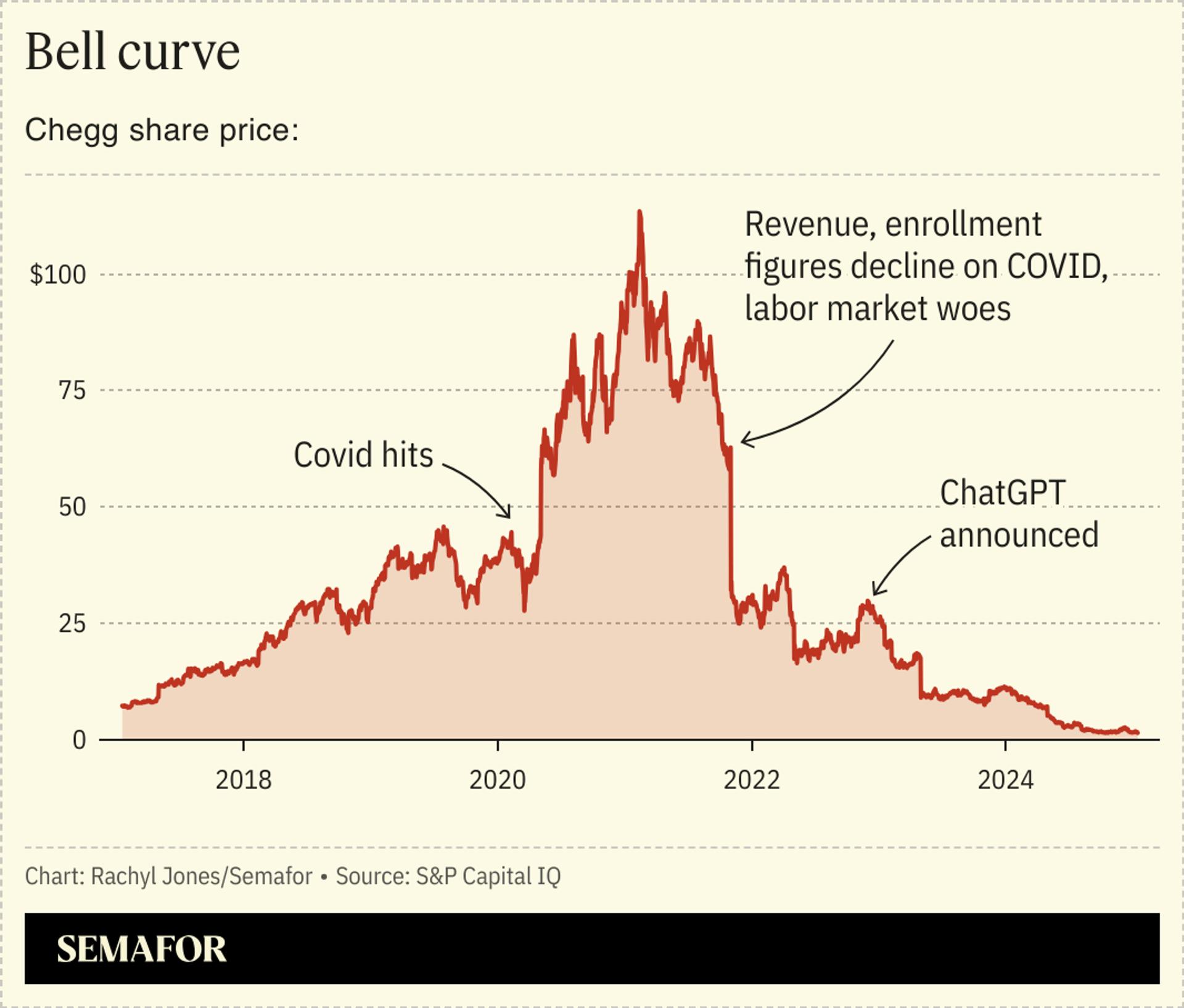The Scoop
Student learning platform Chegg is betting big on the technology that almost killed it — artificial intelligence.
This month, Chegg is releasing two new AI-powered features intended to help students master the coursework they once sought the platform to simply complete for them, more than two years after the release of ChatGPT crashed its stock. But even companies like Chegg that have been threatened by AI see the technology as key to their future, though it’s unclear if the move will boost sales.
Its new features will generate practice questions on complex materials and allow users to choose their preferred large language models directly on the Chegg site — first ChatGPT, and later Gemini, Llama, and even DeepSeek, CEO Nathan Schultz told Semafor in an exclusive interview.
“In ’25, you’re going to see us continue our mission of: how do we personalize and contextualize?” he said. “How do we leverage our AI systems to do that instantaneously?”
Chegg will display answers to the same question from various AI models and offer insights on why solutions may differ — like if the models took different routes to solve the same calculus problem. Allowing users to compare models and see the reasoning for each is critical to the platform’s success, Schultz said.
Students are already comparing these models because “the trust of AI is really low,” he said. Setting up different accounts and switching between tabs to do so is “an incredible time waste.”
Since building AI into its platform beginning in 2023, Chegg can provide answers instantaneously — and it is now pushing its explanations, comparisons, and practice problems to help students learn the material. An emphasis on the learning process also helps mitigate criticisms that Chegg faced from educators in recent years — that students don’t use the platform to study, but to cheat.
“The bedrock of Chegg is that students can trust the content we’re going to produce for them,” Schultz said. “We’re in education. You can’t get things wrong.”
Know More
Chegg was a darling of the pandemic, seeing its valuation catapult to $10 billion on a surge in remote learning. But developments in machine learning coupled with a decrease in college enrollment hurt Chegg’s share price.

In response, the study website went straight to the source. It overhauled its entire platform so students interact primarily with a chatbot, rather than a more traditional search engine with answers written by human experts.
Previously, if an answer didn’t exist in Chegg’s 132 million-large solutions archive, it would call on human experts for an answer, resulting in a lag time for the student. These experts now check that solutions produced by the models are correct rather than answering the questions themselves.
“We believe humans are super important in the post-AI world,” Schultz said. “The only difference is their job has changed from being content creators to moderators, trainers, augmenters, quality [assurance].”
Chegg’s revenue has yet to catch up. Sales have declined each year since its 2021 peak, with the quarter ending in September (the most recent figures available) generating the least revenue of any quarter in four years. On an annual basis, Chegg’s sales still exceed those prior to the pandemic.
Step Back
At the core of Chegg’s new focus on the learning process is how classrooms are changing, Schultz said. As AI tools become more accessible, educators have begun adjusting their course requirements to ensure students are learning the material instead of simply feeding test and homework questions into large language models for quick answers. They are replacing at-home quizzes and assignments with in-class assessments to determine grades.
The shift towards AI has also made it cheaper for Chegg to run as a business. During the first nine months of 2024, the company’s operating expenses decreased 13% to $371 million from the same period the year prior, apart from other adjustments. It also cut roughly 40% of its workforce.
Rachyl’s view
Chegg is shifting from what was essentially a Google for homework to a 24/7 tutor that will notify students when it has created a set of flashcards or practice problems on topics they have asked about. It coincides with the increasing personalization of technology — Netflix recommendations, Spotify’s curated playlists, “For You” feeds on social media — the list goes on.
While Chegg could rely on its own AI models, it would be difficult to compete with the giants who have billions at their disposal to improve their technologies. Pulling answers from those models, comparing them on-screen, and reformatting them into a learning format offers something different — and gives students a reason to keep paying their subscription bill each month.
Room for Disagreement
The demand for practice problem generation and on-screen AI comparisons has yet to be seen.
At $19.95 per month for its premium product, Chegg will have to compete with similarly priced AI models like ChatGPT that may have stronger name recognition with young people. Colleges are beginning to offer student accounts for ChatGPT, and Big Tech firms are enticing them with discounts and cash credits. Google and Microsoft’s services may also tie more closely into students’ email addresses, calendars, and documents — allowing for additional functions like message summaries, automated calendar updates, and editing tools.
Notable
- Primarily used by college students and focused singularly on education, Chegg has a unique challenge that doesn’t face other subscription businesses — about a quarter of its users age out of needing the service each year when they graduate. Chegg amped its marketing efforts last month to reach new spring semester students, launching a friendly mascot that students can connect with.
